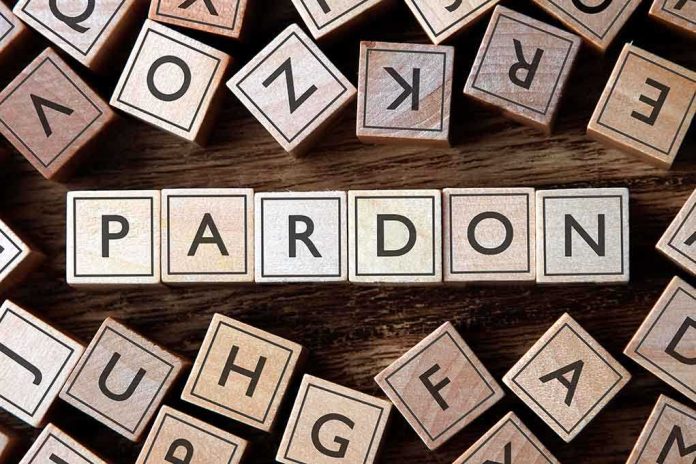
What if the most dramatic use of presidential power in living memory ended up changing nothing—except the boundaries of what American leaders dare attempt?
Story Snapshot
- Donald Trump pardoned 77 allies, including Rudy Giuliani and Sidney Powell, for their roles in the 2020 fake elector scheme.
- The pardons, though extraordinary in scope, offer little real protection—state-level charges remain untouched.
- Trump’s move is framed as an act of “national reconciliation,” but it has sparked fierce debate about accountability and executive power.
- Legal experts warn this precedent may reshape future election disputes and the use of presidential clemency.
Trump’s Unprecedented Pardons: Power Meets Its Limits
Donald Trump’s latest headline grab isn’t just another twist in America’s endless political drama; it’s a leap across the Rubicon of presidential authority. On November 7, 2025, Trump signed off on 77 pardons for key figures in the 2020 election subversion effort—Rudy Giuliani, Sidney Powell, Mark Meadows, John Eastman, and a host of others. The move is unrivaled in magnitude, extending presidential clemency to nearly every major player implicated in the fake elector plot. Yet, for all its boldness, the act is mostly show: most of these individuals are fighting state, not federal, charges. The presidential pardon, powerful as it is, can’t reach into Georgia, Arizona, or Michigan courtrooms.
Trump’s proclamation, couched in language about healing national wounds and correcting injustices, reads like a call for unity. But the timing and context are impossible to miss. These pardons come as state prosecutors continue to grind forward, undeterred by federal gestures. Giuliani, Powell, and others had already faced indictments and, in some cases, plea deals—Powell and Jenna Ellis among them, now cooperating against fellow defendants. The pardons do nothing to halt these proceedings.
The Fake Elector Plot: A Timeline of Escalation
The roots of these pardons trace back to the chaotic aftermath of the 2020 election. Trump’s team, led by Giuliani and Powell, blitzed courts with lawsuits and the media with claims of fraud. When those efforts fizzled, the strategy pivoted: alternate slates of Republican electors would sign certificates falsely declaring Trump the winner in states he had lost. This maneuver, orchestrated by lawyers like John Eastman and Kenneth Chesebro, aimed to give Congress a pretext to reject certified results on January 6, 2021. The fallout was swift—state and federal investigations, criminal indictments, and a legal reckoning that continues today.
No modern president has issued such broad pardons related to election interference. Nixon’s Watergate pardon was narrower; Reagan’s Iran-Contra clemency didn’t attempt to rewrite the outcome of a national vote. Trump’s action stands alone, both in its ambition and its legal impotence where state prosecutions are concerned.
Symbolism and Realpolitik: The Limits of Presidential Power
The gulf between symbolism and substance is wide. The recipients of Trump’s grace—Giuliani, Meadows, Powell—may enjoy federal immunity, but their primary legal risks remain at the state level. Georgia’s racketeering case, Arizona’s ongoing probes, and similar efforts in Wisconsin and Nevada continue, even as some cases have stalled or been dismissed. For prosecutors, the pardons are a speed bump, not a roadblock. Trump himself, notably, is not among the pardoned; his own legal fate remains unresolved as state and federal charges loom.
For Trump’s base, these pardons signal loyalty and defiance—a rebuke to prosecutors and a rallying cry for supporters who see the legal campaign against his allies as political persecution. For critics, they raise alarms about accountability, precedent, and the potential for future abuses of executive clemency. Legal scholars warn that normalizing such sweeping pardons for election-related conduct could embolden future misconduct and further erode trust in America’s electoral system. The public, meanwhile, is left to wrestle with the implications: if presidential power can shield friends from federal, but not state, consequences, what does that mean for the rule of law?
What Happens Next: Precedent, Polarization, and the Long Game
The short-term effect of Trump’s pardons is clear: a handful of high-profile defendants breathe easier—at least in federal court. State-level prosecutions grind on, with some recipients now compelled to testify against former allies. The long-term impact may prove more profound. By framing the pardons as a gesture of “national reconciliation,” Trump has attempted to recast a divisive episode as a healing moment, even as legal battles rage. The precedent set here—of using presidential clemency to shield those accused of undermining an election—may echo through American political life for years to come.
The stage is set for future confrontations over the boundaries of executive power, the independence of state prosecutors, and the resilience of democratic institutions. The only certainty is that the story is far from over—and the next act may be even more contentious.



